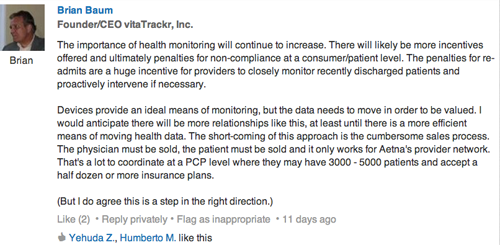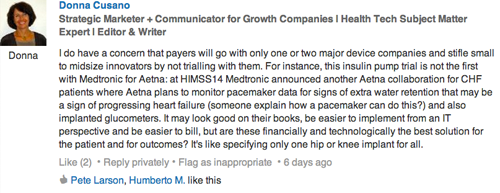Medtronic Teams up With Aetna On HF and Diabetes. Good Idea or Bad?
Medtronic and Aetna are collaborating to manage patients who have congestive heart failure and Type II diabetes. It's a new kind of partnership, but is it a good idea or a fool's errand?
March 18, 2014

A few weeks ago, Aetna CEO Mark Bertolini announced at the annual HIMSS conference that the insurance company was collaborating with medical device maker on heart failure and diabetes.
It’s a novel collaboration and underscores how the healthcare industry is undergoing unprecedented shift. Aetna is of course keen to bend the cost curve of healthcare and manage its own expenses, which necessarily means keeping a handle on chronic diseases such as heart failure and diabetes. Medtronic needs to find ways to grow and get paid for products at a time when hospitals want to keep people healthy and out of the emergency room for as long as possible.
But is the partnership a good idea or bad? As with everything, it depends on your perspective, as was seen when the question was put to the Medical Devices Group on LinkedIn.
In the first instance, Aetna would assess congestive heart failure patients by looking at device data that will focus on situations when these chronically ill patients retains fluid thereby showing rapid weight gain. In many cases fluid retention may lead to hospitalization. Medtronic, through its various cardiac products, provides the OptiVol fluid trend that can monitor such fluid retention to predict worsening heart failure condition in a patient. Presumably, if Medtronic can demonstrate to Aetna that its products can remotely monitor patients such that it triggers care for the patient before fluid retention becomes the cause for hospitalization, Aetna will see the real value of Medtronic’s heart failure products. The speculation is that Medtronic’s offerings may become the exclusive choice of Aetna as it covers its chronic heart failure patients through its network of providers.
A similar story may likely unfold with the duo’s second partnership on diabetes. A Medtronic press release shows that “Using claims data, Aetna will identify members who may be good candidates for insulin pumps and, with Medtronic, will notify their doctors about the program. If a doctor and member decide to use a Medtronic insulin pump, the member will be enrolled in Medtronic’s Getting2GoalSM program, designed to help simplify insulin pump therapy.”
The idea is to see whether Type II diabetes can be managed cost effectively by moving them from insulin injections to insulin pump therapy.
Most people who commented on the collaboration on the Medical Devices Group on LinkedIn seemed to agree that more such partnerships will become a reality in the future as payors, device makers and others contend with the new healthcare paradigm.
Others provided detailed commentary.


However, others commented that partnerships like these might hurt small companies and new innovations.


It is entirely possible that smaller device makers and those not having the clout of a Medtronic may end up losing in the way described above. Nonetheless, the collaboration demonstrates that device makers are finally willing to test whether their products can actually help to lower costs instead of adding a bell and a whistle to an existing product and charging a premium for it - as was the model in the past.
[Photo Credit: iStockphoto.com user Rawpixel]
-- By Arundhati Parmar, Senior Editor, MD+DI
[email protected]
You May Also Like

.png?width=300&auto=webp&quality=80&disable=upscale)
